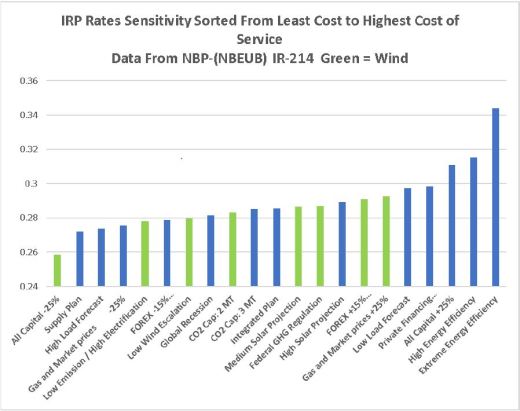New Clear Free Solutions has submitted evidence to the Energy and Utilities Board that NB Powers Integrated Resource Plan [IRP] is putting the Province at risk of the Federal Government putting an additional gas tax on New Brunswickers, and is driving electricity rates up.
Click Link to Read Evidence New Clear Free Solutions Matter 375 Evidence January 18 2018 New Clear Free Solutions Matter 375 Evidence Web
Chris Rouse, who submitted this evidence and has asked to be qualified as an expert at the hearings and states:
“It is not the new carbon tax policy that the federal government won’t like, it will be NB Powers IRP. We need to show them in September how we can significantly reduce our emissions without any additional tax slapped on us. NB Power’s IRP will not satisfy the Federal government, and if we get an additional gas tax it will be NB Powers fault. “
Using information provided by NB Power Mr. Rouse supplied the following graphs to the utilities board. They show that all of this extensive energy efficiency the Utility has been promoting, using ratepayer money, has almost no effect on emissions when compared to doing nothing. NB Powers grid is 75% carbon free so the effects of efficiency are minimal.

Chris also asked the utility how their ratepayer funded Reduce and Shift Demand programs was going to affect its bottom line. The information from NB Power showed that over the next 10 years the Utility is going to loose almost $700 million in net earnings and negatively affect its Corporate objective of earning enough money to reach a 20% equity target.

Lost earning equals higher rates, so Mr Rouse also asked the utility if ratepayers would still need a rate increase if the Utility Board does not approve NB Powers efficiency programs. The results show we could go 3 years, equaling a 6% rate increase, with no rate increases and reduce debt even further than the current plan.
NB Power asserted in its evidence that rates will be higher but customers bills will be lower due to the efficiency.
Chris’s concerns about these programs increasing rates was supported by the evidence submitted by the public interveners consultant. He identified issues with NB Powers way of thinking. Mr Kenecht states in his evidence:
“The primary implication is the converse of that described above for “minimize rates,” namely that the “minimize cost” test may very well result in higher rates, resulting in cross-subsidies from non-participants to participants.” Kenecht then goes on to recommend NB Power update its IRP.
Mr. Rouse was also concerned about the cross-subsidization and asked NB Power for the percentage of participants vs non participants during the hearing process to see if these programs are fair. The results from the utility show that less than 1% of ratepayers are participants and 99% of ratepayers are ending up with higher bills.

There are also concerns about who can participate in these “incentive” programs due to the significant upfront costs, so only wealthy people can participate. When asked about it during the hearings NB Power responded:
“NB Power is also investigating potential financing mechanisms to reduce the barriers in programs that require “significant” upfront participant investment to participate.”
After a lot of research into this it was found that this issue of “lower bills” vs “lower rates” is not something new. He found that there was a shift in NB Power thinking in 2010 when lower bills was chosen over lower rates, and that the previous Public Utilities Board and NB Power have both agreed in 1991 and again in 2001 that lowest rates was the appropriate measure not lowest bills.
With some guidance from Kerrie Blaise, an environmental lawyer from Ontario, Chris is arguing that the Utility has interpreted the legislation wrong and that the Electricity Act puts a priority on “lowest possible rates” not lowest bills.
Chris assert that the evidence shows efficiency won’t solve the problem and we risk the federal government taking additional actions on the Province. In order to stop climate change we need to just simply shift from fossil energy to renewable energy. He provides almost every publicly available data source that shows renewable energy is the lowest cost energy on the market and still dropping. The solution is now less expensive than the problem so there is no need to wait.
Again using NB Power supplied information, Chris presented another graph that showed the other options in NB Powers Integrated Resource plan, sorted from least cost rates to highest cost rates. The options with wind power all have lower rates, and shows more efficiency is going to lead to skyrocketing rates.

Chris provides a new plan to NB Power that instead of reducing and shifting demand to defer investments, will invest the Carbon tax into renewables and switch industry and automotive sectors over to a green grid. This plan is compatible with the new proposed legislation that contains many of the same principles his group has been promoting for several years. NB Powers evidence shows the more energy NB Power sells the lower rates can be. NB Power can increase its earnings without rate increases just by simply displacing fossil fuels from other sectors.
Chris reminds the Utilities board and NB Power he is not opposed to efficiency just the efficiency programs that NB Power has developed. He offered 4 different programs that would lead to lower rates while significantly reducing emissions.
While we all think efficiency is a good thing, Chris’s intervention highlights that it can be dangerous if it is taking time and money away from the real solution renewable energy. Efficiency is always good personal policy, but bad public, and environmental policy.





